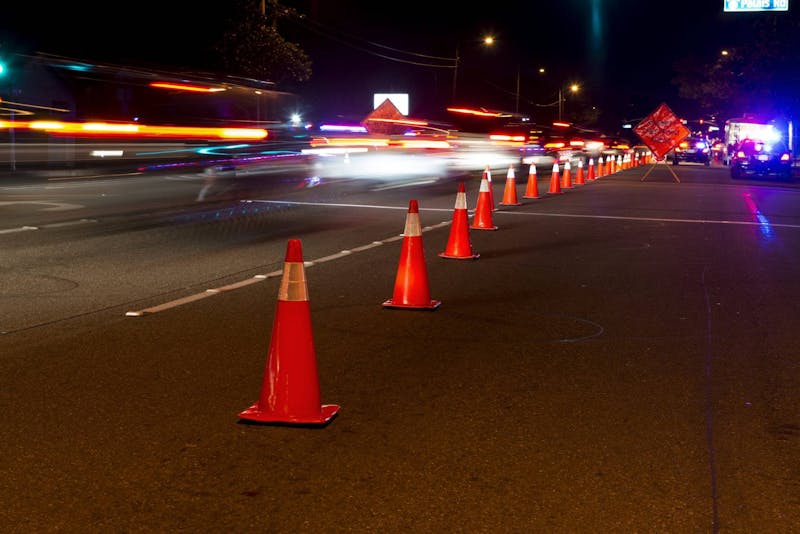
According to the Governors Highway Safety Association, 37 U.S. states conduct DUI checkpoints in an effort to keep drunk drivers off the road. Some states simply choose not to operate these checkpoints. But in other states, DUI checkpoints are prohibited because they are viewed as a violation of drivers’ constitutional rights.
What are DUI checkpoints? Are these checkpoints legal in Florida? How can a Tampa criminal defense attorney help after a DUI arrest? Here’s what you need to know before hitting the road:
What Are DUI Checkpoints and Why Are They Used?
DUI checkpoints are pre-planned roadblocks that police use to catch drunk drivers. These checkpoints are typically set up near busy intersections and are operated during times when intoxicated driving is more common, such as late at night or on the weekend.

Many law enforcement agencies set up DUI checkpoints on New Year’s Eve or Fourth of July since impaired driving tends to spike around these holidays.
What Are the DUI Checkpoint Laws in Florida?
In Florida, DUI checkpoints are legal. But law enforcement agencies must follow certain rules and procedures when operating these checkpoints. Some of the rules and procedures that must be followed at a checkpoint include:
- The law states that law enforcement agencies must “reasonably operate” DUI checkpoints. If the checkpoint is unreasonable, it may be illegal. For example, if the officers are holding up traffic as a result of the checkpoint, it may be considered unreasonable.
- Law enforcement agencies must use a pre-determined formula or procedure to determine which drivers should be pulled over at the checkpoint. For example, officers may decide to pull over every third or fourth vehicle. They cannot choose to pull over drivers on a hunch or pull over someone who “doesn’t look right.” They must stick to the pre-determined selection method.
- The driver shouldn’t be delayed longer than necessary. The law enforcement officers conducting the checkpoint cannot ask a driver to stop and wait for an unreasonably long time.
- Law enforcement officers must place signs up that warn drivers that they are approaching a DUI checkpoint.
- Law enforcement officers must put safety first when planning DUI checkpoints. This means they cannot conduct a checkpoint in a location where it may be dangerous to pull to the side of the road if stopped. The location must also be well-lit.
- Law enforcement agencies must publicly post the date and location of all scheduled sobriety checkpoints. This way, motorists know which areas they should avoid if they do not want to deal with the inconvenience of stopping at a DUI checkpoint.
If you are arrested at a DUI checkpoint, your Tampa criminal defense attorney will need to determine if the law enforcement agency followed these rules and procedures. If a mistake was made during the operation of the checkpoint, your charges may be dismissed.
Do You Have to Stop At A DUI Checkpoint?
Yes, you must stop at a sobriety checkpoint if directed to do so by an officer. If your car is selected, you’ll be asked to pull to the side and provide your license, proof of insurance, and registration.

The officer will observe your behavior and listen carefully to how you answer their questions. If they suspect that you are intoxicated, they may ask you to take a sobriety test.
Can You Turn Away From A Checkpoint?
Law enforcement agencies are required to put up signs that warn drivers that they are approaching a DUI checkpoint. If you see these signs, you may wonder whether or not you have the right to turn around and drive away to avoid the checkpoint.
You are allowed to avoid a sobriety checkpoint by making legal traffic maneuvers. For example, if you can make a legal U-turn in order to avoid a DUI checkpoint, the police cannot pull you over. However, if you avoid a DUI checkpoint by making an illegal traffic maneuver, the police may pull you over.
How Can You Find Out Where And When Officers Will Conduct DUI Checkpoints?
Law enforcement agencies are required to publicize upcoming DUI checkpoints. You can find information on upcoming DUI checkpoints in a number of different ways.

Websites such as The Roadblock Registry and DUIBlock.com frequently post information on upcoming DUI checkpoints around the country. Local newspapers may also post articles on upcoming DUI checkpoints near you.
Furthermore, the information can be found on law enforcement agencies’ websites and social media platforms. These are great resources to check if you want to avoid DUI checkpoints in your neighborhood.
Should You Answer Questions At A DUI Checkpoint?
If a police officer asks for your license and registration at a DUI checkpoint, you will need to comply with this request. But if an officer starts to ask you other questions, you are not obligated to answer them,
For example, an officer may ask you something like, “Have you had anything to drink?” You are not legally required to answer this question. If you don’t want to sit there in silence, you can simply say “I decline to answer,” or “I am exercising my right to decline to answer.” You will not be penalized for your decision to exercise your rights.
Seek Legal Representation If You Are Arrested For DUI
If you are arrested for DUI in Florida, seek legal representation from an experienced DUI attorney as soon as possible. Remember that a DUI conviction in Florida can lead to serious penalties. Some of these penalties include imprisonment, probation, fines, license suspension, and community service. A DUI conviction can also increase your insurance rates, which can cost you thousands of dollars.

The best way to avoid these penalties is to fight your charges with help from an experienced DUI attorney. Let our team work tirelessly to protect your rights and secure your freedom after a DUI arrest.

